住まいのマニュアル
住まいのマニュアル
J&F Plaza 暮らしの手続き
1.光熱費、水道について (Utilities)
一般的な賃貸物件では、入居時には電気、ガス、水道が止められています。その為、入居前にご自身でそれぞれの会社に連絡をし、入居後すぐに利用できるよう契約をしてください。弊社など外国語対応の不動産会社の場合は、サービスで代わりに連絡をしてくれる場合もあります。
In case of general apartments, when you move in, all utilities(electricity/water/gas) are cut off.
Therefore, each tenant has to contact utility companies and sign the contract right after moving-in.
There is a case that the foreign-oriented real estate companies like us call them instead as one of the services.
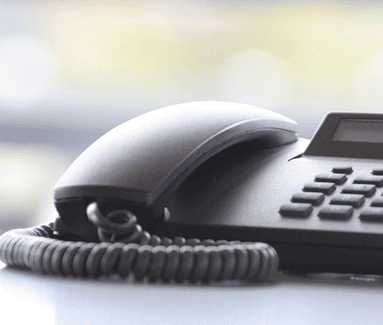
2.電話 (Phones)
(1)電話 (Phones)
日本には、大きな携帯電話会社が3社あります。
NTT Docomo、KDDI AU、Softbankの3社です。大型電気店や専門ショップにて携帯電話を購入することが可能です。各社によって金額やプラン、機能が異なりますので事前に調べてから購入して下さい。なお、契約時には電話会社によって必要な物があります。学生証、 国民健康保険証、 銀行預金通帳、印鑑、 パスポートなど。詳しくは電話会社にお問い合わせしてください。
There are three big cellular companies in Japan: NTT Docomo, KDDI AU, Softbank. Cellular phones/plans can also be purchased at large electronic shops and specialty shops. There are different plans and services offered, it is recommended to research beforehand. Documents such as student card, national health insurance card, bank book, name seal, etc. are needed for making a cellular service contract. However, it may vary by company. Please contact the cellular companies directly for detail information.
(2)国際電話 (International calls)
直通で国際電話をかけるには、国際アクセス番号 + 国番号 + 地域番号 + 電話番号の順にかけます。国際アクセス番号というのは、国際電話をかけるときに国番号の前にダイヤルする番号です。日本から外国にかける場合の国際アクセス番号は、001(KDDI)か041(日本テレコム)を使います。外国から日本にかける場合は、その国の国際アクセス番号をダイヤルします。
To directly make an international call dial (International access code)+(Country code)+(Area code)+(Phone number) in order. International access code is a number you dial before country code. If you call a foreign country from Japan, international access code is 001 or 0041. If you call Japan from a foreign county, dial international access code of the country.
3.銀行の手続き (Banking)
(1)口座を開設する (Opening an account)
はじめて口座を開くときは、まず、「普通預金申込書」に次の必要事項を記載します。・氏名、住所、入金額(必ずいくらか入金することが必要)
When opening an account you must first of all fill in the “Application for Saving Accountform” with the following information:
Name, address, and the amount you will be depositing that day.
手続きは「ご新規」の窓口で行います。
The counter with a “go-shinki(New Accounts)”sign is the one where you can open a new account.
氏名欄の右端の丸欄には、印鑑を押印します。印鑑を持っていない場合は、サインでも受け付けてくれます。
You will need to stamp the appropriate spot with your Inkan(seal). If you do not have an Inkan, the bank may accept your signature.
普通預金口座の開設に必要なものは次のとおりです。
The following are required when opening a bank account:
a.加入者の確認書類
b.金融機関への届出印(外国人はサイン可の場合も)
a. ID such as yourresidence card oand passport.
b. Your personal Inkan(seal) if you have one (not always required for foreign residents).
加入者の本人確認書類は、運転免許証のほか、健康保険証、社員証、学生証、印鑑証明書、パスポート、在留カードなどが使われます。運転免許証の記載住所が現住所と異なる時、及び運転免許証がない場合(運転免許証以外の書類で本人確認をおこなったとき)は、さらに住所を確認する書面(3ヶ月以内のもの)が必要です。
There are various kinds of IDs you can use when opening an account. They are a driver’s license, health insurance card, company ID, school ID, Certificate of Seal, passport, and residence card. If the address stated in your driver’s license is different from your current address or if you don’t have driver’s license(if you present your ID except for a driver’s license), other documents which prove your current address will be required. Resident’s card, utility’s bill or receipt (within past 3 months) with your current address.

口座を開設する時には、キャッシュカードの発行も申し込めます。カードがあると現金自動預支払機(ATM)が利用できます。
When you open your savings account, you can also apply for a cash card, which allows you to use an ATM (Automatic Teller Machine).
(2)ATMの使い方 Using an ATM
キャッシュカードをもっているとATM(現金自動預け払い機)を利用できて大変便利です。カード持っていれば基本的には24時間いつでもATMを利用することが出来ます(各銀行により異なる場合や年末年始等で利用できないケース有)。
It is convenient to have a cash card because you can use an ATM with it. Also, it basically enable you to use ATM for 24 hours(There is a case that ATM would be closed because of year-end vacations or depending on banks)
4.在留カード (Residence-card)
在留カードは,中長期在留者に対し,上陸許可や,在留資格の変更許可,在留期間の更新許可などの在留に係る許可に伴って交付されるものです。
The aim of theresidency management system is to enable the Ministry of Justice to continuously keep information necessary for managing the residency of foreign nationals residing in Japan for the mid-to long-term with resident status, and ensure greater convenience for those foreign nationals.
入国管理法に基づき資格を有する中長期的に日本に合法的に在留する外国人(以下「中長期在留者」という。)に適用され、次の1から6のいずれかに該当する場合は対象となりません。
(1)3ヶ月以下の滞在許可を与えられた者(Persons granted permission to stay for 3 months or less)
(2)時訪問者」ステータスを付与された者(Persons granted “Temporary Visitor” status)
(3)「外交官」または「公式」の資格を与えられた者(Persons granted “Diplomat” or “Official” status)
(4)上記(1)~(3)の外国人に相当する法務省令で定める者*(Persons recognized by Ministry of Justice ordinance as equivalent to the foreign nationals in the aforementioned (1) to (3)*)
(5)特別永住者(Special permanent residents)
(6)在留資格のない者**(Persons with no resident status**)
この制度は、日本人と結婚した日本人(日本人の配偶者や子ども,日系)の在留資格がある中長期居住者に適用されます。「技術者」、「人文・国際サービスの専門家」などの技術者、技術者、学生、永住者など、日本の雇用主に勤務する人を「長期滞在者」といいます。観光客として日本に短期間滞在する人には適用されません。
This system will apply to mid- to long-term residents in Japan, such as those married to a Japanese national as well as Japanese descendants (”nikkei”), whose status of residence is “Spouse or Child of Japanese National,” “Long Term Resident,” etc., those working for an employer in Japan, whose status is “Engineer,” “Specialist in Humanities/International Services,” etc., as well as technical interns, students, and permanent residents. It will not apply to those visiting Japan for a short period of time as a tourist.
*法務省令では、「指定活動」を有する日本国東アジア関係協会及びパレスチナ常任理事国の事務所及びその家族を定めています。
The Ministry of Justice ordinance specifies staff of the Japanese office of the Association of East Asian Relations and the Permanent General Mission of Palestine in Japan who have “Designated Activities” status, and their families.
**現在の外国人登録制度で不法滞在者を登録することはできますが、新しい在留管理システムに登録することはできません。日本に不法滞在する外国人は直ちに最寄りの地方入国管理局に連絡し、必要な手続きをすることをお勧めします。詳しくは、入国管理局の「入国管理局の手続きに関する情報(http://www.moj.go.jp/nyuukokukanri/kouhou/nyukan_nyukan87.html)」をご覧ください。
While illegal residents can be registered under the present alien registration system, they cannot be registered under the new residency management system. Any foreign national illegally staying in Japan is advised to immediately visit the nearest Regional Immigration Office and follow the necessary procedures. For more details, please see the “Information on Procedures to Follow at Immigration Offices(http://www.moj.go.jp/ENGLISH/index.html)” on the Immigration Bureau of Japan’s website.
5.郵便局 (The post office)
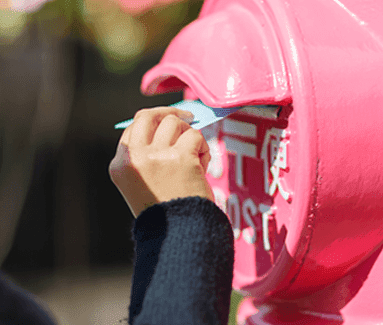
(1)郵便物を送る Sending mail
通常郵便物は、ポストに投函すれば、郵便局員が回収します。回収時間は、ポストの横にかかれています。
Ordinary letters placed in a public mailbox are collected by a post office clerk.
Collection times are listed on the side of the mailbox.
小包は、郵便局にもっていくか、又は、電話をすれば取りに来てくれます。
When you send parcels, you can either take them to your post office, or telephone the post office and have them picked up at your home.
郵便局から送金するには、為替証書を郵送する方法と受取人の振替口座に送金する方法があります。国内の場合には、現金書留で送ることもできます。
You can send money by a postal money order or transfer it into your recipient’s postal account. Also, you can send cash by registered mail, but only within the country.
銀行と同じように郵便局でも、口座を開設して、貯金、公共料金の口座振替等ができます。口座があれば、全国の郵便局で預金や払い戻しができます。
A postal account can be used like a bank account. You can deposit and withdraw your money at any post office in the country, and make account transfer payments of public utility charges such as gas, water, electricity and telephone.
6.印鑑 (シールSeal)
日本では、サインと同じ意味で印鑑が用いられ、主に確認したことを示すために押す認印と、公的な重要書類に押す実印を使い分けます。
A personal seal is used in Japan for the same purposes as a signature is used in other countries. Types of seals include regular personal seals used for confirmation and registered seals used for important official documents.
日本での諸手続きを簡単にするためには、印鑑を持つと便利です。
To make your financial life easier in Japan, it is recommended that you obtain a personal seal(Hanko).
印鑑登録とは、役所に自分の印影を登録することで、登録した印鑑のことを「実印」といいます。役所に印鑑を登録すると、必要に応じてその印鑑が登録済みであることを証明する「印鑑登録証明書」をもらうことができます。この証明書は、実印が押印している書類は、印鑑を登録した本人の意思に基づくものだという証明になり、金銭消費貸借や不動産のような重要な契約書類に使います。証明書の申請は、役所の区民課及び出張所に印鑑登録証を提示して行います。
Seal registration is to register the imprint of your seal at the City Office. The registered seal is called Jitsuin. After registration, you can request a Certificate of Seal Registration if necessary. The certificate proves that the document with your registered seal is legal, and is required when when signing important contracts involving the leases or loans, etc. To obtain this certificate, bring your Seal Registration Document(Card) to the Residents’ Division of the City Office or a branch office.
7.健康保険 (Health insurance)

日本での生活でもっとも不安に思うことのひとつが「病気になったらどうしよう」ということだと思います。日本の医療費は、諸外国に比べてとても高いといわれています。たとえば、風邪で医者にかかると5000円くらいは覚悟しなければなりません。虫垂炎などで入院するとなると数十万円はかかります。このように全額の医療費を自己負担するのは大変です。
In Japan, one of your greatest worries may be “what do I do if I get sick?”Japanese doctors and hospitals are expensive . Visiting a doctor for a simple cold or flu is likely to cost you \5,000. If you are hospitalized for an appendicitis, it is likely to cost hundreds of thousands of yen. Because of these high prices, it is difficult for any individual to afford doctor fees on their own. To ensure that people can receive medical treatment without worry, everyone who lives in Japan is legally required to join one of the public health insurance plans.
健康保険制度は、一回の医療費の負担を軽くするために考えられた制度です。保険に加入すると、病気やけがをしたとき、窓口では医療費の30パーセントを支払えばよいことになっています。残りの医療費は、普段みんなから集めた保険料から当てられます。日本国内に住んでいる人はみな、必ず何らかの公的な健康保健に加入することが法律で義務付けられています。
The Health insurance system is intended to reduce the high cost of health care. Once you have enrolled in the national health insurance program, you will pay only 30% of the doctor’s fee if you get sick or are injured. The rest of the fee will be paid for by your insurance. Everyone who lives in Japan is legally required to join one of the public health insurance plans.
外国人の方も会社などに勤務した場合を除き、在留期間が3か月を超える場合は国民健康保健に加入しなければなりません。留学生も同様です。
Foreign students as well as foreign residents who are going to stay for more than 3 months must enroll in the National Health Insurance Program if they are unemployed or not enrolled in a worker’s health insurance program at their place of employment.
ただし、在留期限が切れている外国人や在留資格が3か月未満の短期滞在、外交や公用で訪日をしている外国人、特定活動のうち医療目的で滞在をする外国人とその帯同者は加入できません。
ただし、在留資格が興業・技能実習・家族滞在・特定活動・の場合でも滞在期間が3か月以下で住民登録がない外国人の場合でも、日本の滞在期間が3か月を超えることを証明する書類がある外国人の場合は国民健康保険に加入することができます。
Foreigners who are not going to stay for less than 3 months, visit Japan for diplomatic matters and have designated activities for medical purpose(including accompanying members) can not enroll in it.
Foreigners who can enroll in National Health Insurance must have Certificate of Alien Registration and his/her period of stay must be more than a year. Therefore, a foreigner who stays for a short term or for sightseeing only cannot enroll.
手続きは、あなたが住んでいる市区町村の国民健康保険課に行って加入手続きをしてください。保険料は、収入や住んでいる地域によって違います。留学生の場合は、保険料の補助を行っている自治体もあります。詳しくは、会社又はお住まいの市区町村役所の国民保健課にお問い合わせください。
Insurance enrollment is conducted at the city offices where you live. First, go to the National Health Insurance Dept. of the same office where you registered your name as a foreigner. The insurance fee varies depending on your income and the area you live in. Also, there are autonomies which support foreign students in reducing the cost of insurance. For more information, contact your company or the National Insurance Dept. of the city office in the area you live.
J&F Plaza 引っ越し
1.引越し (When moving)
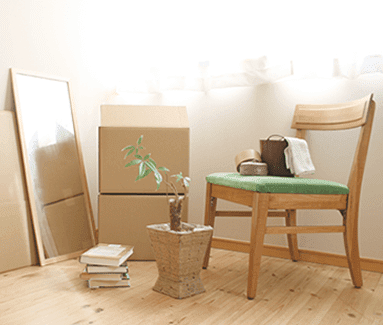
(1)新居での手配 Utilities and Registration
①住所変更通知
Contact each utility office. Because most offices do not have English speaking staff, we recommend that you ask a friend who can speak Japanese for assistance.
②在留カードの申請及び住所変更
Apply for a Residence card and an official change of address.
③銀行口座の開設及び住所変更届
Open a bank account and officially change your address with your bank.
④運転免許証の住所変更 Change the address on your drivers license
新住所の所轄警察署で、必要な手続きを行ってください。
To change the address on your driver’s license, go to the local police office of the area where you now live.
(2)挨拶 (Greetings)
万一のときに、頼りになるのは隣人です。また、今後、生活する上で、思わぬ迷惑をかけてしまうかもしれません。トラブルがあったとき、普段の付き合い方で感じ方も異なります。日頃のつき合いを大切にし、良好な関係を保つようにしましょう。
It is a good idea to greet the landlord and neighbors when you move in. First impressions in Japan are very important. In times of emergency it is your neighbors who will help you the most. Also, if you have a good relationship with your neighbors they are less likely to complain about noise and other disturbances.
 |
 |
 |
|---|---|---|
| こんにちは | kon-nichiwa | Hello |
| ごめんください | Gomen-kudasai | Excuse me, but is anybody home? |
| はじめまして | Hajimemashite | Nice to meet you. |
| よろしくおねがいします | Yoroshiku onegai-shimasu | I'm pleased to make your acquaintance. |
| わたしは**です | Watashi ha (****)desu. | My name is (****) |
| ありがとう | Arigatou | Thank you |
| すみません | Sumimasen | I am sorry |
| おげんきですか | Ogenki-desuka | How are you doing? |
| げんきです | Genki-desu. | I'm fine thank you. |
| どういたしまして | douitashimashite | You are welcome. |
| ひっこしてきました | Hikkoshite-kimashita | I moved into *** |
(3)入居時の修理 (Repairsbefore Youmovein)
入居前には、ひどく傷んだり壊れたりした箇所は修理してあります(畳・ふすま・壁・塗装等をすべて新しくするわけではありません)。もし、疑問に思うことがあれば、入居後すぐに担当者に問い合わせましょう。時間が経過してから申し出をしても、応じてもらえない場合があります。
Before moving into an apartment that has had previous tenants any severe wear or damage will have been repaired, however this does not mean that the unit will have been completely refurbished with new tatami mats, sliding doors, wall surfaces, paint, etc... Contact your real estate agent immediately if you have any questions about repairs when you move in. Please note that a request for repair work can only be accepted if the problem is reported without delay.
2.室内清掃 (Taking care of your new home)
(1)新築住宅の湿気 (Humidity)
建設されて間もない住宅は、かなり湿気があるため、カビが生えることがあります。天気のよい日には窓をあけ風通しをよくし、壁・押入れ・天袋などを乾燥させてください。
Due to the relatively high humidity inside recently built housing, you should take extra care to avoid mold buildup. On sunny days it is best to air out rooms and allow the walls, closets,storage, etc., to dry out.
(2)結露 (Condensation)
梅雨の時期や冬に暖房をすると壁に水滴がつきます。放置するとカビが発生しますので、乾いた布でふきとったり、ワイパーで取り除くと共に換気を行います。 特に北側の部屋・押入には注意して、通風を良くするようにしてください。
Heating in the winter may cause drops of water to condense on the walls and give rise to mold. Be especially careful about condensation in rooms and closets on the northern side of a building. Keep these rooms well aired out and wipe away any condensation droplets that may form with a dry cloth.
日本の気候は、温暖多湿なので、梅雨の時期や夏は湿気が多く、また、冬は暖房により窓ガラスや壁に結露ができます。放置するとカビが発生しますので、結露が発生した場合は、乾いた布でふきとると共に換気を行います。
The climate in Japan is warm and humid. During the rainy season and the summer, humidity is higher, and during the winter the use of heaters causes condensation on windows and walls. If this condensation is not dealt with properly, mold will follow. If you notice condensation in your room, wipe it up with a dry cloth and ventilate the room well.
また、押入の中も結露しやすいので、換気に気をつけます。特に、梅雨の時期や冬はふすまの両端を少し開けて、換気をするように心がけましょう。
As the insides of oshi-ire(closet) are also prone to condensation, ventilate them well. During the rainy season and winter, opening both fusuma a bit at the edges helps keep an oshi-ire’s(closet) interior dry.
3.ゴミ (Garbage)
ゴミは、所定の場所に可燃ゴミ、不燃ゴミに分け、それぞれ指定されている日に出して下さい。
Sort your garbage into combustible and incombustible trash, and put each out in the designated place on the appropriate collection day.
ゴミをベランダなどに放置すると、害虫の発生、悪臭などで近隣にも迷惑を及ぼしますので、注意しましょう。
Do not leave garbage on the veranda or in other places where it might cause a nuisance to neighbors by attracting insects, giving off odors, etc.
バルコニー、廊下・階段、窓などから、ゴミや水を決して捨てないようにしてください。
Do not, under any circumstances, throw garbage or water from a balcony or window, in the corridors, on stairs, etc.
家具や電化製品などの粗大ゴミは、普通のゴミ置場ではなく、清掃事務所に連絡して取りに来てもらいます。リサイクルを利用してもよいでしょう。
Don’t put large sized rubbish such as furniture and electrical goods where you put out the daily garbage. In order to dispose of such items you must phone the waste management office and arrange for their disposal. Another way to get rid of these types of items, is to selling them at a secondhand shop.

4.騒音 (Noise)
コンクリート住宅は、意外に音が伝わりやすいものです。
Sound travels through a concrete building more easily than you might think.
多数の来客があった場合、大声で騒ぐことは控えてください。
When you have guests, refrain from raising your voices loudly.
夜間に廊下を歩く音や階段を昇る音、また、窓を開け放したままの話し声やドアの開閉音など意外と大きく聞こえるものです。特に深夜の騒音は睡眠の妨げとなるので、十分注意して、静かな環境をつくりましょう。
At night, footsteps in the hallway, people going up the stairs, voices heard through open windows, and doors opening and closing sound even louder. Noise late at night in particular can disrupt your neighbor’s sleep. Ensure that you do your part to maintain a quiet environment.
子供の飛び跳ねる音は、階下にはかなり響くので注意しましょう。また、掃除機、洗濯機は大きな音が出て、近所の迷惑になります。朝は8時頃から、夜は9時頃までにしましょう。
Remember that the sound of a child jumping up and down reverberates quite loudly in the unit below. Vacuum cleaners and washing machines tend to be quite noisy and may bother your neighbors. Try to use them between 8 o’clock in the morning and 9 o’clock at night.
騒音防止の工夫(Some devices for soundproofing)
音が伝わりやすい板床にはカーペットを敷く。また、裏がフェルト地などのやわらかい素材でできた室内ばきを使うと音があまり気にならない。
Try spreading a carpet over a wooden floor and put on slippers with soles made of soft material such as felt.
隣室に接する壁には本棚や洋服ダンスをおく
Put a book shelf or wardrobe against walls that adjoin neighboring units.
オーディオやテレビなど音が出るものは壁から少し離して設置し、直接、床におかない。
Set your TV or audio equipment away from the wall, or not to put them directly on the floor.
椅子の足にキャップをかぶせる。
Cover the feet of your chairs with fabric or rubber caps.
ドアを閉める音の対策には、ウレタンの隙間用テープを扉枠のドアがあたる部分に貼る。音が吸収されるだけでなく、隙間風防止にも有効。
If you are concerned about the loud noise your closing door makes, paste polyurethane tape on the door frame. Not only is it soundproof, but it also fills the gap between the door and the frame, providing insulation.
流しの排水パイプには、ボロ布などを巻くと水の流れる音が小さくなる。
Try wrapping rags around drainpipes to prevent the sound of water flow.
洗濯機の騒音には、防振マットを敷くと、振動音が減る。
Place a sound dampening mat under the washing machine.
J&F Plaza 部屋の使い方
1.玄関 (Entrance hall)
玄関には、必ず表札をつけてください。
Please be sure to put a nameplate outside your front door.
住宅の鍵には、マスターキーがありません。万一、鍵を紛失されますと、錠ごと取り替える費用を負担して取り替えなければなりません。
There is no master key for the housing units. Take care not to lose your key. If you do, the lock will have to be replaced at your expense.
玄関の土間は防水してありませんので、清掃時には絶対に水を流さないように注意してください。
The floor of the entrance hall is not waterproofed. Do not pour water on the floor under any circumstances, even when cleaning.
玄関の戸の下に物をはさんで開け放しておくことはしないで下さい。蝶番のゆがみで施錠できなくなったり、ドアクローザーが故障したりします。
Do not wedge anything under your front door to keep it open, as this may warp the hinges and make it impossible to lock the door.
集合郵便受け箱には必ず名札を差し込みましょう。
Be sure to place a name card on your mailbox in the common mailbox area to ensure correct delivery.
姓名が郵便受けにかかれていないと、郵便配達の人は宛名に人が住んでいるかどうか迷ってしまいます。友人と一緒に住んでいる場合は両方の姓名を書いておいて下さい。
If your name is not indicated on the mail box, a postman will be uncertain of your residence. Do not fail to put your name on the mailbox. If you live with your friend(s), please put all the names.
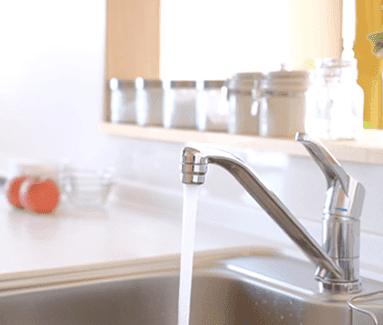
2.台所 (Kitchen)
排水管のつまりの原因になりますので、ゴミは絶対に流さないようにします。廃油も固まって詰まる原因となりますので流さないで下さい。
Never put garbage down the kitchen sink as it will block the drain. Used Cooking oil can also block the drain as it hardens. Do not pour oil down the sink.
飛び散った油の飛沫を放置したままにすると、付着したほこりやゴミが酸化してしつこい「油よごれ」になります。そうなると、なかなか汚れが落ちにくくなります。
When you are done cooking, please thoroughly clean the kitchen area immediately afterwards.
If spilt oil is not properly cleaned up, it will turn into oil stains or grease spots. Once they get to this point they are nearly impossible to remove.
調理をした後は、台所の汚れをきれいに拭き取る習慣をつけましょう。かんたんなお手入れも、習慣化すると、とても効果的です。
Make it a habit to wipe the kitchen area clean each time you finish cooking. This simple habit is the most effective way to control what could easily become a messy kitchen.
3.バルコニー(Balcony)
サッシ等で囲いをし、部屋を改造することは禁じられています。また、通常、バルコニーに物置等を設けることは認められていません。
You may not remodel or redesign the balcony in any way for your own use. You may not, for example, enclose it with window sashes to make it into a small room, or use it for storage of any sort.
バルコニーは、入居者個人で管理するものです。日頃からサビが発生しないように気をつけましょう。バルコニーに鉢植えなどを置くと、肥料や水がバルコニーにかかり、サビの原因になります。
The care of the balcony is your responsibility, as a tenant. Be careful about rust. If you put potted plants on a balcony, for instance, water or mud from the plants could cause damage.
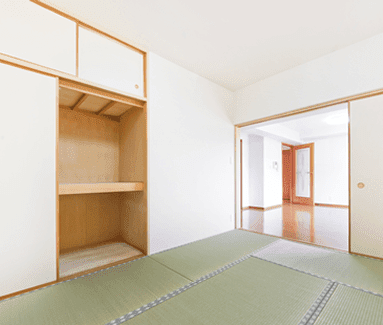
4.リビング (Living room)・・和室(Washitsu)
「和室」とは、床材として日本特有のタタミを使用している部屋のことです。
“Washitsu “are rooms which use Japanese “tatamimats” for flooring.
湿気と埃は、タタミの敵です。湿気と埃のあるタタミは、ダニやカビが発生しやすく不衛生ですので、掃除や換気を十分に行ってください。
Tatami mats are easily damaged by moisture and dust. Wet and/or dusty tatami can attract ticks or other bugs, so take care to keep the tatami clean and well aired.
タタミにジュータンを敷くとダニやカビが発生しやすくなります。
Ticks and bugs are more likely to be attracted to tatami covered with mats or rugs.
タタミが汚れたときは、水を薄めた漂白剤を布にしみこませ、タタミの表面を拭き取ります。汚れが落ちたら、水拭きしたのち渇いた布で水気をふきとります。タタミは湿気やすく、カビが生えやすいので、よく換気をしてください。
If tatami gets dirty, you can clean it by gently wiping it with a cloth soaked in diluted bleach. Use another cloth to wipe it try. Since tatami is sensitive to moisture and molds easily, try to keep windows open as much as possible.
5.風呂 (Japanese bath)
風呂の入り方 (Taking a bath, Japanese style)
ふろの使い方は、家庭によって少しずつ違うようですが、ここでは、一般的なものをご紹介します。
Although the bathing ritual varies from home to home, the following is a typical example of how you should bathe:
①まず、身体を軽く洗います。
At first, briefly rinse with water
②湯船に入ります。
Get in the tub.
③外できれいに身体を洗います。
Wash thoroughly while standing outside of the tub.
④浴槽に入って体をよくあたためます。
Return to the tub, and soak until you’re warm
⑤身体をよく拭きます。
Dry off completely.
家族全員が入るまで、入浴後も浴槽のお湯は抜きません。
After you’ve finished bathing, leave the water in the bathtub when you go.
| 銭湯の入り方 (Using a Public Bath) |
|---|
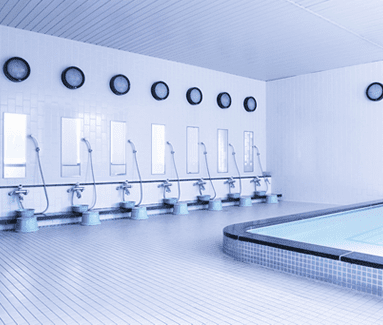
①まず、服を脱いで、服と荷物をロッカーに入れて鍵をかけます。鍵はなくさないようにします。 Place your clothes and things in a locker, and be sure to lock it properly. You should keep the key with you the whole time you are in the bath house. ②湯船に入る前に身体を洗ってください。 Before you get into the bathtub, wash hair and body at the washing area. The bathtub is only for soaking, not for washing your body. ③洗い場で下着とか洗濯はしないようにしてください。洗い場からでるときは、身体を拭いてからでます。 Do not wash clothes or underwear in the washing area. |
| 銭湯の入り方が分からない時の日本語表現 (Asking for help in Japanese) |
銭湯の入り方を他の人にたずねる時に使います。
I don’t know how to use a public bath.
「sentou no hairikata ga wakarimasen。oshiete kudasai。」 |
6.水まわり(Utilities)
(1)ガス Gas
換気の不足、ガス漏れ、不完全燃焼の場合は、一酸化炭素中毒になる危険があります。
Inadequate ventilation, gas leaks, or incomplete combustion pose a danger of carbon monoxide poisoning.
入居する時はガス会社の立会いで開栓し、ガス漏れの有無、器具取扱い上の注意を聞いて事故のないようにします。
When you move in, have the gas company send a serviceman to open the main gas valve in your unit, check for leaks, and explain the precautions you should take when using gas appliances in order to prevent accidents.
(2)水道 Water
台所やトイレの水が止まらなくなったり、配管などから漏水しているときは、メーター・ボックス内の元栓を閉めてから、受け持ちの営業所等へ連絡してください。
If the water will not stop running in the kitchen, toilet, etc., or if you notice that a pipe is leaking, turn off the main stopcock in the meter box, and then contact your local office, etc.
水道使用中に断水があったときは、直ちに蛇口を閉めてください。
If water is cut off while you are running the faucet, turn it off immediately.
閉め忘れますと、断水が解消したときに自分の住戸はもちろん、階下の住戸まで水浸しにすることがあります。このような場合は、すべて原因者の負担で建物を修理しなければならない他、他人に与えた損害の賠償もしなければならなくなります。
If you forget to turn off the faucet when service is restored, you may flood not only your own unit but also those below. The person responsible for flooding in such cases will be charged for the cost of repairs to the building and will also be required to pay compensation for any damage to other people’s property.
外出時には、必ず水道の蛇口をよくしめ、また外泊などの時は元栓も閉めるようにしましょう。
Always ensure that faucets are properly turned off before you go out, and if you are going to be away overnight or longer, turn off the main stop-cock as well.
7.共用部分 (Commonuse facilities)
(1)階段・廊下 (Stairs and corridors)
階段や廊下には物を一切置かないで下さい。通行の邪魔になるだけでなく、非常時の避難に差し支えます。
Do not leave any objects on the stairs or in the corridors. They not only get in other people’s way, but also obstruct evacuation in an emergency.
(2)自転車置場 (Bicycle stands)
自転車等の盗難その他の事故による被害については、仲介業者および家主は、一切の責任を負いませんので、事故防止には十分気をつけてください。
Take care to guard against theft and accidents regarding bicycles, as we cannot accept responsibility for theft or other accidental loss of any kind.
不要になった自転車等は、ご自分で廃車し、決して自転車置場に放置しないようにしてください。
If you have a bicycle, etc., that you no longer need, dispose of it properly. Do not abandon it in the bicycle stand.
J&F Plaza 暮らしの安全
1.防犯 (CrimePrevention)
共同住宅で起こる犯罪には、空き巣、痴漢などが多いので、特に次の点に注意しましょう。
Crimes that tend to occur frequently in multi-household complexes include burglaries while the occupants are out, and sexual assault. You should pay special attention to the following:
戸締りをし、のぞき窓やドアチェーンを十分に活用してください。
Lock up securely, and make use of the peephole and door chain.
平素から隣近所と連絡をとりあい、留守にする時などは、隣近所にその旨を伝えるようにしてください。
Make a habit of keeping closely in touch with your neighbors, let them know when you are going to be away, and so on.
夜間は、女性や子供だけでのエレベータ利用を避けるようにしましょう。
At night, women and children should avoid using the elevators alone.
見知らぬ人の出入りには、特に気をつけましょう。
Be particularly alert if you see a stranger on the premises.
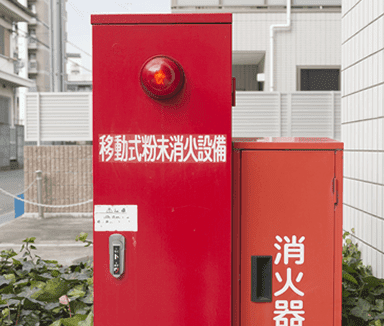
2.火災 (Fires)
(1)日常の注意 (Daily care)
火災をおこさないために、日頃、次のような点に注意しましょう。
To prevent fires, be careful of the following:
・寝たばこをしない
Do not smoke in bed
・料理中にコンロから離れる時はちょっとの間でも火を必ず消す
Extinguish all flames before leaving the kitchen.
・お風呂を空焚きしないように注意する
Be careful about heating an empty bathtub.
・ガスコンロのまわりに燃えやすいものを置かない
Do not place any combustibles near the gas range (stove).
バルコニーに設置されているハッチや仕切り板は、非常時の避難口になっています。ハッチや仕切り板の近くには、絶対に物を置かないようにしてください。
The hatch and dividing partitions on the balcony serve as emergency evacuation Never leave objects close to a hatch or partition.
(2)消火と避難 (Fire extinguishing procedures)
小さな火災なら、自分で消火できる場合も少なくありません。濡れた布巾やシーツをかぶせたり、布団や毛布で火元を覆い上から水を掛けたりして消火します。
Small fires can be extinguished by covering them with a wet towel, or covering them with a Futon or blanket and then pouring water on it.
消火器は、以下の方法で使います。炎に向かって噴射するのではなく、火元に薬剤をかけるようにして使うと効果的があります。
Fire extinguisher is handled as follows. Squirting at fire source is more effective than doing over flames.
①安全栓を引き抜きます Pull the stopper off
②ノズルを火元に向けます Direct the nozzle at the fire
③レバーを強く握ります Squeeze the lever
近所から火事がおきた時には、窓や出入り口を閉めて火や煙が室内に入らないようにし、至急119番に電話してください。
If a fire breaks out nearby, close your doors and windows to keep out smoke and flames, then dial 119 immediately.
火災の煙は、上昇するので、なるべく姿勢を低くして逃げるようにしましょう。その際、煙を吸わないように、濡れタオルやハンカチを口にあてます。
Because smoke (caused by fires) rises, escape in a low position, putting a wet towel or handkerchief to your mouth. Breathe through the wet towel or handkerchief to avoid inhaling the smoke.
3.地震 (Earthquakes)
地震の時はあわてて廊下や階段に飛び出したりするとかえって危険です。落ち着いて行動し、まず火の始末をしてください。
If an earthquake occurs, do not rush out to the corridor or stairs. Rushing out in a panic is dangerous. Remain calm, and turn off all sources of fire immediately. If a fire breaks out, extinguish it.
コンロや石油ストーブはもちろん、電気器具もスイッチを切り、コンセントも抜いておきます。ガスの元栓も必ず閉めて下さい。
Turn off a gas range at the main, oil-heater, electric fittings, and pull outlets off, too.
避難する時は、ブロック塀のそばや狭い路地は危険です。なるべく広い通りを通って避難しましょう。また、思わぬ物が頭上から落ちてくることがあります。頭や身体は、布団などで被って保護してください。
When you shelter, avoid brick wall and narrow alley, and protect your head and body with a futon and so on.
(1)備蓄の目安 (Emergency supplies)
いざというときのために、非常用の飲料水・食料・医薬品・防災用品などを備えておきましょう。
Keep on hand an emergency supply of drinking water, food, medicine, disaster-prevention articles, etc.
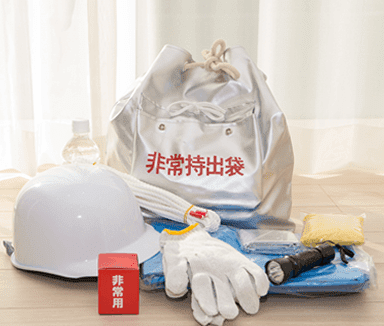
①飲料水 最低でも1人1日3リットルが必要。3日分位を用意すると安心。
Drinking water・・・At least 3L a day per person is needed. Prepare for 3 days.
②食料 米、もちなどの主食の他、副食として缶詰、レトルト食品など
Food・・・Rice as staple diet, cans and retort pouches as side dish
③燃料 卓上用コンロ、予備ボンベ、固形燃料など
Fuel・・・desktop gas range, spare gas cylinders ,and solid fuels, etc...
④照明 懐中電灯、予備電池
Light・・・flashlight, spare batteries.
⑤工具類 のこぎり、バール、ロープ、簡単な日曜大工セットなど
Tools・・・saw, crowbar, rope, carpenter’s kit, etc...
⑥その他 毛布、軍手、カート(ポリタンクや荷物を運ぶ時に使う)、自転車、ドライシャンプー
Others・・・blanket, work glove, cart(to carry baggage), bicycle, dry shampoo, etc...
(2)非常持ち出し品リスト(List of goods to take when travelling during an emergency)
リュックサックなどに入れて、すぐに持ち出せるように準備しておきましょう。
Prepare the following in a backpack
①食料関係 水、乾パン、レトルト食品、缶詰、ナイフ
Food・・・Water, hardtacks, retort pouches, cans and knife
②救急関係 救急医薬品、常備薬、防災頭巾、ぼうし
First-aid kit・・・medicine, hood, cap
③貴重品 現金、印鑑、預金通帳、身分証明書(パスポート、在留カードなど)
Valuables・・・cash, signet, bankbook, ID(passport, Residence card
④衣類等 下着、寝袋、雨具、タオル
Clothing・・・underwear, sleeping bag, rainwear, towel
⑤日用品 ラジオ、懐中電灯、予備電池、軍手、ロープ、マッチやライター、使い捨てカイロ、防塵マスク、生理用品、紙おむつ、ティッシュ、ウェットティッシュ、包装用ラップ、筆記用具、厚手のゴミ袋
Commodities・・・radio, flashlight, spare batteries, work glove, rope, matches or lighters,Body warmers, thermal mask, sanitary napkins, disposable,diapers, tissues,Wet tissues, plastic wrap, stationery, trash bag
⑥その他 底の厚い靴、スリッパ、ホイッスル、入れ歯など
Others・・・shoes with thick sole, slippers, whistle, false teeth
(3)家具転倒防止の工夫 To prevent furniture from falling during an earthquake
地震によるけがの原因は、その半数が家具の転倒です。建物が無事でも、家具の下敷きになってけがをしたり、身動きが取れなくなって、火災に巻き込まれた例が少なくありません。室内の安全のために、避難通路の確保のために、家具を固定しておくことは大切です。
Most injuries that occur during earthquakes are caused by furnishings and appliances falling over. Even if a building itself is ok, there are many people who are crushed under heavy appliances and furnishings: refrigerators, large bookshelves, cabinets, etc... It is important to fix interior furniture to be as secure as possible.
家具を固定する場合、家具と壁をネジ留めするのが一般的ですが、賃貸の場合、壁に穴をあけられない場合があります。そこで、壁も家具も傷つけない方法をご紹介しましょう。
Although fixing furniture to the wall with screws is common, you might be prohibited to put holes in the wall because of the lease. The followings are some ways to avoid damaging both furniture and walls.
①転倒防止用ツッパリ棒 (Prop)
家具専門店、量販店、大型ディスカウントショップで売られています。家具と天井に突っ張り棒を取り付け、家具を固定します。特に、冷蔵庫は、キャスターがついて動きやすいので、注意してください。
また、天井と家具のすきまにぴったりサイズの箱を詰めるのも一つの方法です。
天井の強度が心配な場合は、突っ張り棒のように点で支えるより、箱のように広い面積で支えると安心です。箱はしっかりした段ボールを選び、固定できるように隙間なく詰めることが大切です。
You can buy props at furnishing shops, volume sale’s shops, and discount store. Fix them to the ceiling and furniture. Especially be careful about a fridge because it is movable with casters. Also, another way is stuff a box in the gap between the ceiling and furniture. Ceiling boxes are often better than props because a box has a wider area to distribute force. Choose a strong cardboard box.
②家具転倒防止板 (Board)
家具の前下部に敷いて、家具の転倒を防止します。敷板をかませておくことによって重心を後ろに移動させ、前に倒れる危険性を少なくします。特に畳やクッション性のあるじゅうたんは、家具が前に転倒しやすいので注意します。
敷板には、市販のゴムシートのほか、ベニヤ板などを使います。
Lay a board under the front of furniture. It will transfer the center of gravity towards the back and lessen the risk of furniture ‘s falling forward.
③棚のものが飛び出さないような工夫 (To prevent shelves from flying out)
地震のゆれによって棚の扉が開いてしまうことがあります。中の物が飛び出すと大変危険であるだけでなく、家具そのものも重心が前にずれて倒れやすくなります。市販のストッパーを使って扉を固定しましょう。ストッパーには、キャビネットのガラスを吸盤で止めるもの、吊戸棚などの把手を粘着テープで止めるものがあります。
There are times during earthquakes when shelves can fly out of furniture which contains shelves. It is not only dangerous, but can also cause the furniture to fall forward because its center of gravity transfers forward. Therefore, fix the doors of furniture containing shelves with a stopper. There are stoppers with sucker for a glass door and stopper to tape knob.
④照明器具などの吊るしものの補強 (Reinforcement of other appliances)
照明、掛け時計、額縁のある写真や絵などが、落下すると大変危険です。チェーンや金具で補強する他、落下した時のことを考えて、かける位置などに注意しましょう。
It is very dangerous if lights, wall clocks, picture frame, etc fall down. Reinforce them by chains or metal fittings, and be careful about the locations where you hang them (over your bed for instance can be dangerous).
4.水漏れ (Leaks)
万一階下へ水が漏れ、損害を与えてしまった場合は、家主に対してだけでなく、損害を受けた方に対しても損害賠償をしなければならなくなります。
If water leaks through to the unit below your apartment, you will be required to pay compensation for any damage incurred, not only to the owners but also to the tenants who are affected.
コンクリートは水を通しやすいものです。少しの水でも階下へ浸み出したり、水滴が落ちたりする場合があります。完全な防水を施してあるのは浴室の床だけです。居室は、もちろん、玄関、トイレ、バルコニー、廊下などに水を流して洗うことはやめましょう。
Concrete is quite permeable to water. Even a small amount of water can seep through the ceiling or drip down to units below. The bathroom floor is the only floor in your unit that has been completely waterproofed. Do not pour water over the floors to wash them; this applies not only to the living areas but also to the entrance hall, toilet, balcony, corridor, etc.
5.ガス漏れ (Gas leaks)
ガスが漏れていたら、まず、屋内の火を全部消し、ガス機器の使用を中止し、部屋やメーターのガス栓を閉めて下さい。(LPガスはガスボンベの元栓・器具栓を閉めて下さい。)そして、窓を開けて風通しを良くし、ガスを追い出します。また、至急、販売業者(∗)に連絡し、点検が終わるまでガスを使わないようにして下さい。 ∗ガス会社(都市ガスの場合)か販売業者(LPガスの場合∗)に連絡して下さい。(ガス警報機やガスボンベに連絡先がかかれている場合もあります)
If you suspect a gas leak, extinguish all indoor fires, stop using gas appliances, and turn off the gas valves in each room or meter. (If you are using LP gas, turn off the valves of all gas cylinders/appliances.) Then open the windows to vent any gas. Immediately contact your gas company, and do not use the gas until the company has performed anoverall check. ∗Contact the gas company if you use Toshi gas, or the cylinder dealer If you use LP gas. You may be able to find the phone number on the cylinder or the gas alarm.
漏れたガスに火花が引火しないように、次の3点を必ず守ってください。
①ガス漏れ警報器をコンセントから絶対抜かない
②電気器具のスイッチやコンセントの差込に触れない
③換気扇は絶対に回さない。
In the event of a gas leak, or a suspected gas leak, take care to points 1 to 3.
①Do not pull the plug of the gas alarm.
②Do not touch the switch of any electrical appliances or any outlets.
③Do not turn of the ventilating fan.
LPガスは、空気より重いので、低いところに溜まります。そのため、低い位置にいる乳幼児やペットは大変危険ですのでご注意ください。
LP gas is heavier than the air and gathers low to the ground. Be aware of this, and take care to lift any children or pets out of danger.
6.転落事故の防止 (Fall prevention)
手すりの側にテーブルなど踏み台になるものを置くと、子供の転落事故につながります。手すりの側には、物を置かないようにしましょう。
A table or other object placed near a railing may enable a child to climb over and thus lead to a fall. Remember not to place such objects near railings.
7.住宅保険 (Housing insurance)
住宅保険は、損害保険の中の「住宅火災保険」と「住宅総合保険」それから、「借家人賠償責任保険」のことをいいます。
Housing insurance refers to: 「home fire insurance」「general housing insurance」 and 「tenant insurance」.
契約時に、保険に加入するよう勧められることは多いでしょう。そのとき、自分が加入する保険がどういう保険なのかを、よく理解する必要があります。
Usually, you will be required to purchase insurance when making a lease contract. The following is a description of the various types of insurance you may be asked to purchase.
住宅火災保険は、保険金の目的が建物で、部屋のある建物が火事で焼けたときの建て替え費用にあてられるものです。
Home fire insurance・・・This covers any damage to the building caused by fire.
住宅総合保険は、保険の目的が家財で、家財や建物を火災、落雷、破裂爆発、水漏れ、盗難等の事故にあったときにおりる保険です。
General housing insurance・・・This covers damage to household effects caused by fire, thunderbolt, explosion, leak, robbery, etc…
借家人賠償責任保険は、自己の責任が借主にある場合で、借主に損害賠償責任が生じたときにおりる保険です。具体的には、タバコの不始末で火事になった、洗濯機のホースがはずれて階下に水が漏れたなどです。住宅総合保険に借家人賠償責任保障がない場合は、特約でつけることができます。
Tenant insurance・・・This covers damage caused by the tenant, that was due to negligence on the part of the tenant (ex-fires caused by cigarettes, candles, water damage from a leaking washing machine, etc...) If the general housing insurance you enter doesn’t guarantee damage caused by the tenant, you can add tenant insurance as well to your contract.
J&F Plaza 緊急時の連絡
1.110番と119番(110 and 119)
(1)大声で人をよぶ(Use a loud voice to alert neighbors)
事故や火事のときは、すぐに隣近所に助けをもとめましょう。とっさに日本語はでないかもしれませんが、一度、声に出して練習してみてください。
If you have an accident or there is a fire you should notify your neighbors and ask for their assistance. Because it might be hard for you to speak Japanese in an emergency situation, you should practice learning the following emergency phrases.
 |
 |
 |
|---|---|---|
| きゅうきゅうしゃ! | kyukyusya | Ambulance! |
| かじだ! | Kaji-da | There’s a fire! |
| どろぼう! | Dorobou | Thief! |
(2)緊急時の通報(Emergency contact numbers)
緊急時の連絡は、通報犯罪・事故などで警察を呼ぶときは110番を、火事・病気で消防車や救急車を呼ぶときは、119番通報をします。
どちらも、24時間体制で通報を受け付けています。
If you need to contact the police because a crime has occurred or there is a traffic accident, dial 110. If you need a fire engine or an ambulance because of fire or sickness, dial 119. Both the police, and fire/medical assistance are available 24 hours.
電話は、110番の場合は警察本部通信司令室、119番の場合は災害救急センターにつながります。受付と同時に、パトカーの緊急出動や緊急配備の発令、又は最寄りの消防署・出張所に消防車や救急車の出動を要請したり、コントロールしたりします。
110 is the number to the Police Headquarter Command Post, and 119 is to the Fire Department Command and Control Center. They will take your call, arrange a police car, fire engine, or ambulance in case of emergency.
公衆電話を使って通報する場合は、お金やカードをいれずにかけることができます。
You can dial 110 and 119 without coin or phone card from a public phone.
(3)通報のしかた(How to notify the proper authorities)
交通事故や火災現場の場合、通報している電話の番号を聞かれます。
公衆電話の場合は、電話機に電話番号が表示されています。
If there is a traffic accident or fire, the operator will ask for the phone number from which you are calling. If you call from a public phone, the phone number will automatically display on the operator`s phone.
携帯電話を使っている場合は、必ず、その旨を伝えます。移動中は、途中で切れてしまうことがありますので、一旦止まってからかけましょう。また、確認のため、警察本部/災害救急センターからかけ直すことがありますので、しばらくの間、電源スイッチをオンにしておいてください。
If you call from a cell phone, it is best to inform the operator that you are using this type of phone in case the connection is lost and they need to re-contact you. Also, it is best to not turn off your phone for awhile because the Police Headquarter Command Post/Fire Department Command and Control Center may need to call you later to find out more information about the situation.
2.事故-救急車の利用(119) (Accidents-calling an ambulance・・・#119)
(1)救急車をよぶ(Call an ambulance)
急病や事故などで救急車を呼ぶときは、まず「119」にダイヤルします。落ち着いて、ゆっくり話しましょう。
When you need an ambulance because of a sudden sickness or injury, dial 「119」.Speak slowly and calmly.
救急車のサイレンが聞こえてきたら、外に出て家の中に誘導します。
時間に余裕がある場合は、健康保険証と現金を用意しておきます。
When you hear the ambulance siren approaching your home it is best to go outside and guide the paramedics to your home and the person who is injured. If you have time it is also best to have your health insurance card and cash ready.
現在、通院している場合は、その旨を救急スタッフに伝えてください。
If you are currently commuting to the hospital when you call for an ambulance inform the operator immediately.
(2)交換手と話す∗(「日本語」[日本語発音](英語)) Emergency Japanese∗(「Japanese」[Pronunciation](English))
交換手がでますので、ゆっくり次の要領でお話しください。
Speak slowly to the operator, following the chart below.
 |
 |
 |
|
|---|---|---|---|
 |
しょうぼうちょうです。 かじですか?きゅうきゅうですか? |
Shoboucyo desu. Kaji desuka? kyukyu desu ka? |
This is the fire department. Is there a fire,or do you need an ambulance? |
 |
きゅうきゅうです | Kyukyu desu. | his is an emergency. |
| 交通事故です | Koutsu jiko desu. | There has been a traffic accident. | |
| ex.)はさまれているなど、できるだけ具体的に言ってください。 ex.)Give as many details as possible, such as, 「はさまれている」[Hasamareteiru]”Someone is stuck.” |
|||
 |
住所はどちらですか | Jusho wa dochira desuka? | What is the address? |
| 何市、何区、何町、何番地(何番)何号ですか? | Nani-shi, Nani-ku, Nani-cho, Nan-banchi, (Nan-ban) Nango-desu ka? | Please give the ward(or city) name first, then the town name/number and then the specific banchi number. | |
 |
X市、X町のXビル前です | X-shi, X-cho, X-biru mae desu. | X City, X cho, in the front of X building. |
 |
お名前は? | onamae-ha? | Who's calling? |
 |
私の名前は・・・ | Watashi no namae ha・・・ | My name is・・・ |
 |
電話番号を教えてください | Denwa bango wo oshiete kudasai. | What is your telephone number? |
3.火事-消防車の利用(119)(Fire-calling a fire engine・・・#119)
(1)消防車をよぶ(Calling for a fire engine)
火事を発見した場合で、初期消火できる場合は、消火を試みてください。(初期消火の仕方は、4.暮らしの安全「(2)火災」参照のこと) 手におえないような場合、また、消火できない場所であれば、「119」通報します。
If you discover a small fire, first try to extinguish it.If this is not possible contact the fire department by dialing 119 immediately.
(2)通報のしかた∗(「日本語」[日本語発音](英語))How to notify the authorities∗(「Japanese」[Pronunciation](English))
交換手がでますので、ゆっくり次の要領でお話しください。
Speak slowly to the operator, following the chart below
 |
 |
 |
|
|---|---|---|---|
 |
しょうぼうちょうです。 かじですか?きゅうきゅうですか? |
Shoboucyo desu. Kaji desuka? kyukyu desu ka? |
This is the fire department. Is there a fire,or do you need an ambulance? |
 |
きゅうきゅうです | Kyukyu desu. | his is an emergency. |
| 火事です | Kaji jiko desu. | There’s a fire. | |
 |
住所はどちらですか | Jusho wa dochira desuka? | What is the address? |
| 何市、何区、何町、何番地(何番)何号ですか? | Nani-shi, Nani-ku, Nani-cho, Nan-banchi, (Nan-ban) Nango-desu ka? | Please give the ward(or city) name first, then the town name/number and then the specific banchi number. | |
 |
X市、X町のXビル前です | X-shi, X-cho, X-biru mae desu. | X City, X cho, in the front of X building. |
 |
何が燃えていますか? | Nani-ga moete masu ka? | What is burning? |
 |
ビルです。X階建てのビルのX階が燃えています。 | Biru-desu. X Kai-date no X kai ga moete masu. | Building. X floor of X stories is burning. |
 |
お名前は? | onamae-ha? | Who's calling? |
 |
私の名前は・・・ | Watashi no namae ha・・・ | My name is・・・ |
 |
電話番号は? | Denwa bango wo. | What is your telephone number? |
 |
電話番号は・・・ | Denwa bangou ha・・ | My telephone number is・・ |
4.交通事故(警察110) Traffic accident(Police #110)
(1)交通事故にあったとき(If you are involved in a traffic accident)
交通事故や犯罪被害にあったときは、パトカーや交番・駐在所の警察官に事情を説明し、処理してもらう必要があります。
If you are involved in a traffic accident or are a victim of a crime, you should immediately contact a police officer in a police car, police box, or police office.
(2)事故確認(Exchange information)
交通事故被害にあったら、加害者に対し、次のことを確認します。
When you are involved in a traffic accident, get the following information from the other party.
・車のナンバープレート(License plate)
・運転免許証番号(his/her driver’s license number)
・住所、氏名、年齢(Address, Name, Age)
・保険会社と保険番号(his/her insurance company name, name, and insurance number)
・電話番号(連絡先)(Telephone number)
目撃者がいる場合は、氏名や連絡先を聞き、後で連絡が取れるようにしておきましょう。
Also, write down any witnesses’ names and addresses if there are any.
5.犯罪被害(警察110) Incidents of crime (Police#110)
盗難にあったら(When you have a criminal accident)
留守中に泥棒に入られて、物を盗まれたり、壊されたりした場合は、110番、地域の警察署又は最寄りの交番に連絡します。
If you are the victim of a crime you should immediately call 110, or go to the nearest police station/ police box.
特に預金通帳やクレジットカードが盗まれた時は、使用されないようにすぐに銀行やクレジット会社に電話します。
If your bankbook or credit card is stolen, call the bank and/or credit card company immediately to inform them.
盗まれたものは、よく思い出し、できればリストにして書き出しましょう。
Make a list of all the items that were stolen.
6.落し物・忘れ物をしたとき(If you lose your belongings)
電車の中で忘れ物をしたときは、駅の「忘れ物取扱所」に連絡します。
If you leave something on the train, report it to the station’s lost and found office.
路上などで落とした場合は、最寄りの警察署か交番へ問い合わせましょう。警察では情報が集中的に管理されていますので、どこの警察署か交番でも情報を得ることができます。
When you lose something on the street, report it to the nearest police box or police station. Since the police share the same information system, you can get information from any police station or box.
7.交番 Koban(Police box)
(1)交番とは(What is Koban?)
日本には、「交番」と呼ばれる警察官の詰め所が地区ごとにあります。警察官は24時間勤務していますので、いつでも利用することができます。
There are police boxes (’Koban’ in Japanese) in each area of Japan. Police boxes are open 24 hours a day.
交番や駐在所は、地域住民の身近にあって、暮らしの安全を守る活動拠点となるところです。交番は、主に都市部におかれ、警察官が24時間体制で交代勤務しています。駐在所は、地方にあり、原則として1人の警察官が家族と共に地域に居住しています。
Koban(police box) and Chuzaisho(a kind of police station) are located throughout each area of Japan. Kobans are mostly located in cities and are open 24 hours. Chuzaisho are located in more provincial areas, and a police officer usually lives with his family in the same area.
(2)交番の役割(Roles of Koban)
交番では、地域住民の暮らしの安全を守るために、次のような活動を行っています。
The followings are roles of Koban to secure local people’s life.
・管内のパトロール Patrol within the jurisdiction
・犯罪捜査 Manhunt
・少年補導 Corrective training
・交通取り締まり Regulation of traffic
・巡回連絡(管内の家庭や事務所などを訪問する活動)Visit houses and offices within the jurisdiction
・迷子や酔っ払い、痴呆老人の保護 Protective custody of a lost child, drunk, the old who have dementia
・道案内 Guiding
・落し物の届出の受け付け Keeping lost articles
(3)外国語での対応(Service in foreign languages)
交番の警察官が、外国語に対応できない場合は、通訳センターに連絡し、通訳センターのスタッフと直接、話をすることができます。通訳センターのスタッフは、外国人から状況を詳しく聞いて、交番の警察官に伝えます。但し,通訳センターへは必ず交番の検察官から連絡することになっています。一般の方が直接、連絡することは出来ません。
When a police officer cannot speak a foreign language, he will call the interpretation center, and the interpreter will speak to the visitor who is looking for assistance. The interpreter will then explain to the officer. However please note that the only way to access the Interpretation Center is via a Koban. You cannot call them directly by yourself.
通訳センターへは、24時間連絡をとることができ、世界各国ほとんど全ての言語での対応が可能です。
The interpretation center is open 24 hours a day and has translators for most languages.
8.その他(Others)
110番や119番は緊急用です。その他の相談、問い合わせはお住まいの地区の警察署へ連絡してください。
110 and 119 is for emergency use only. If you have other questions and problems, contact the nearest police station.



